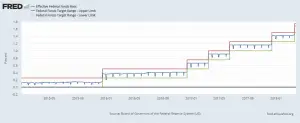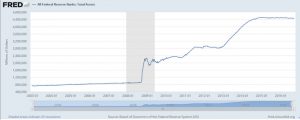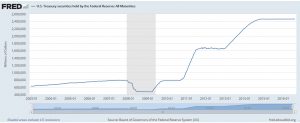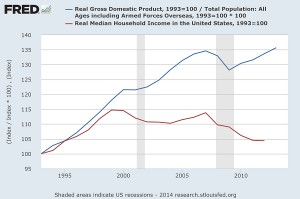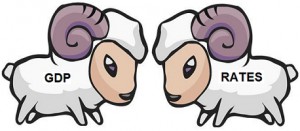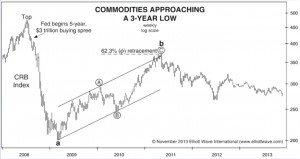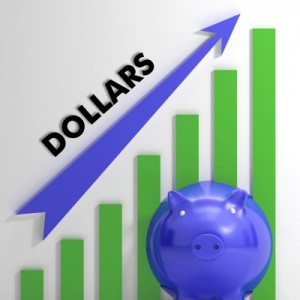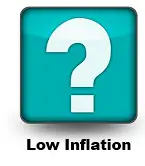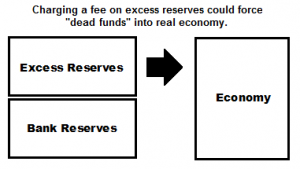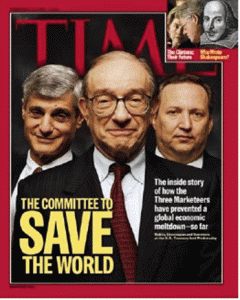In common usage, inflation refers to steadily rising prices of goods and services over time, while "deflation" relates to falling prices. Inflation is both a boon and a bane to the economy and the rate of inflation is affected by a variety of factors including FED monetary policy, interest rates, supply vs. demand, and the Velocity of money. However, strictly speaking, rising prices are "price inflation" which is generally caused by "monetary inflation" i.e. the expansion of the money supply, among other things. See What is Inflation? for more info. Many Keynesian Economists believe that Inflation is a prerequisite for economic growth and prosperity and Keynesians believe Monetary … [Read more...]
Annual Inflation Up Slightly in August
The U.S. Bureau of Labor Statistics (BLS) released their monthly inflation report for August on September 16th. According to the BLS Annual Inflation rose from 0.84% in July to 1.06% in August bringing inflation back in line with the levels in April through June. Inflation was 1.13% in April, 1.02% in May, and 1.01% in June. However, the rise was not due to high monthly inflation. Monthly inflation was only 0.09% for August 2016. Rather annual inflation rose because August 2015's -0.14% fell out of the equation. Interestingly, if last month's monthly inflation of -0.16% .was swapped with this month's 0.09% the Annual Inflation rate would have been much more stable. The rate would look … [Read more...]
July Inflation Down for 3rd Consecutive Month
The U.S. Bureau of Labor Statistics (BLS) released their monthly inflation report for July on August 16th. According to the BLS Annual Inflation declined for the third consecutive month. Annual inflation was 1.13% in April, 1.02% in May, 1.01% in June and 0.84% in July. Not only did the rate of inflation fall but actual consumer prices declined as the CPI-U index declined from 241.038 to 240.647. Thus monthly inflation was -0.16%. For the year food at home was down -1.6%, energy was down -10.9%, used cars and trucks were down -3.7%, while overall transportation was down -4.9%. With all of these categories down one might wonder what actually caused the inflation rate to rise that meager … [Read more...]
US Consumer Spending vs. FED Inflation Decision
The Fed will meet on the 16th and 17th of September to decide whether it’s time to normalize its accommodative monetary policy. But despite vice-chairman Stanley Fischer’s hints at an inflation increase in September, analysts still think that several factors complicate the FED’s decision. Recent turbulence in equities markets across the globe as well as uncertainties about China’s market are only some of the factors putting a damper on the economy. During an Economic Policy Symposium held in Wyoming this August, central bankers discussed how inflation would finally rise despite these issues. After all, the factors that had been holding it down (including fading oil prices, downward … [Read more...]
Economy vs. Fed Rate Hikes
Confusion Continues The bad news is markets tend to get jittery when the Fed is preparing for a new interest rate cycle. The good news is the primary reason the Fed is contemplating raising interest rates is a strengthening U.S. economy. The question in the short run is: Will the economy be strong enough to offset the negative impact of higher rates? The odds of the answer being “yes” increased Thursday. From Reuters: Gross domestic product expanded at a 4.2 percent annual rate instead of the previously reported 4.0 percent pace, the Commerce Department said on Thursday. Both business spending and exports were revised higher, while a buildup in business inventories was smaller than … [Read more...]
Why the Fed Does Not Control Inflation and Deflation
Although we may not always agree with Steve Hochberg's conclusions the following video contains some very thought provoking ideas accompanied by some charts that you probably haven't seen anywhere else. It's interesting to note the quadrupling of the FED's leverage over the years since 2008 and the amazing lack of inflation associated with it. Check out this excellent six-minute video clip by Elliott Wave International's Steve Hochberg... at the Orlando Money Show. Despite the Fed's leverage and its attempt to inflate throughout the economy, the deflationary pressures in the U.S. are overwhelming. Gain an Advantage Over 99% of U.S. Investors - in Just 15 MinutesYou can … [Read more...]
How “Excess Reserves” and the Money Multiplier Could Trigger Inflation
Banks have $2.5 trillion parked in "excess reserves". This is money on deposit with the FED. The FED pays a miniscule amount of interest on these reserves but the banks are willing to loan it to the FED because it is easy no risk income. But it is also the reason that the money multiplier is falling! And when the money multiplier is falling the FED has a very hard time increasing the money supply. So if the FED really wants to increase the money supply all it has to do is decrease the interest rate it pays on excess reserves and the banks will find some place else to deploy it. Which could trigger massive inflation. ~Tim McMahon,editor A Fed Policy Change That Will Increase the Gold … [Read more...]
Inflation Expectations and the FED
As inflation expectations rise the FED has less and less "wiggle room" to stimulate the economy. But how do you measure "inflation expectations"? In today's article, Chris Ciovacco will show us. ~Tim McMahon, editor Low Inflation Leaves Fed’s No Taper Door Open Fed Lost Control In 2008 In early December, we used Japan as an extreme example of why central banks are terrified of allowing their respective economies to slip into a deflationary spiral. Do the same concepts apply to the United States? They do. The federal government offers standard Treasury bonds (IEF) and Treasuries that provide some protection against inflation (TIP). The law of supply and demand tells us that when demand … [Read more...]
FED Looks for New Ways to Crank Up Money Supply
With all the talk about "Tapering" you'd think the FED was actually considering reducing it's money pumping. But in actuality that is not it at all. The FED is afraid that it is creating a a bubble in the stock market so it is looking for ways to continue its pumping but shift it enough so that the money goes somewhere besides just to the stock market. In other words, it is still worried about the economy and realizes that it is doing more harm than good but feels trapped, so it is looking for new ways that might work better. If the FED can figure out how to free up the log jam of "excess reserves" held by the banks, liquidity could be sloshing around the economy before you know it and … [Read more...]
Taper Caper: Has the FED Been “Politicized” or “Captured”?
By Ben Hunt, Ph.D. Two things happened this week with the FOMC announcement and subsequent press conferences by Bernanke, Bullard, etc. – one procedural and one structural. The procedural event was the intentional injection of ambiguity into Fed communications. As I’ll describe below, this is an even greater policy mistake than the initial June FOMC meeting when “tapering” first entered our collective vocabulary. The structural event ... which is far more important, far more long-lasting, and just plain sad ... is the culmination of the bureaucratic capture of the Federal Reserve, not by the banking industry which it regulates, but by academic economists and acolytes of government … [Read more...]

